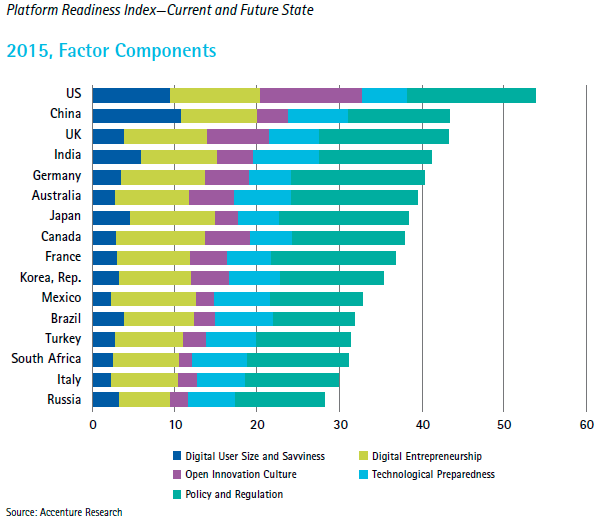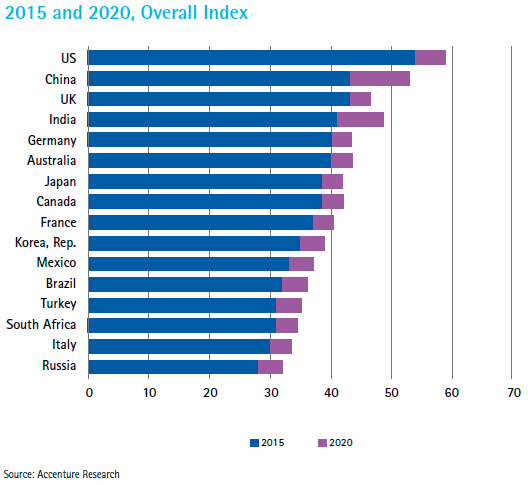Platform-based businesses from Salesforce to Uber have become some of the world’s biggest economic success stories in recent years, but Canada’s government and business leaders have been slow to foster the type of innovation culture that leads to more of them, according to a recent study by professional services firm Accenture PLC.
Released in mid-September, the organization’s “Five Ways to Win with Digital Platforms” study has Canada in eighth place out of 16 G20 countries based on its “platform readiness index,” which measures five factors including a population’s tech savvy and “innovation culture” – the ability of a country’s businesses to collaborate on improving digital technology.
Canada scored especially low on innovation, an Accenture representative told IT World Canada, coming in 14th place.

“Policy makers must appreciate that platform business models are becoming a key route for the growth and global expansion of small businesses and entrepreneurs, who are the driving force of job and wealth creation in most economies,” authors Laurence Morvan, Francis Hintermann, Madhu Vazirani write in the study, noting that platforms are becoming “the principal route by which incumbent market leaders can enter adjacent markets and re-invent themselves in the digital era.”
The authors say the success of digital platforms, which they define as applications that facilitate commercial exchanges between two or more groups, can be traced back to three features:
- Their networking effect, which brings a greater number of customers, merchants, and partners together than 20 years ago, at a fraction of the cost;
- A convergence of technologies including cloud, automation, analytics, artificial intelligence, and mobile devices that’s creating a targeted “as-a-service” economy that gives large and small companies alike access to scalable, on-demand, and high-quality services at comparatively low prices; and
- The pervasive, rapidly expanding volumes of open and shared data that specialists from a wide range of industries can mine for often-unforeseen value.
“While it used to take Fortune 500 companies an average of 20 years to reach a billion-dollar valuation, today’s digital start-ups can get there in four years,” the authors write. “And digital platforms are largely responsible for that shift.”
Where leadership comes in
So how can business leaders and governments facilitate that success? Accenture’s report contains good news and bad news.
The bad news, of course, is that both parties can do better: in addition to Canada’s lackluster ranking, only 15 per cent of Fortune 100 companies have developed digital platform business models to begin with, according to Accenture.
The good news is, a low score does not mean that platform owners and partners cannot succeed, or that governments are incapable of raising their country’s score, the researchers write.
“China, the United States and India clearly benefit from their large base of digital users and high level of user savviness, particularly smartphone usage,” the authors admit, noting that India and China are likely to show the greatest improvement by 2020 mainly because of online population increases and public policy improvements.

However, all three nations have several other supportive elements in place too, they note, including high levels of digital entrepreneurship and a collaborative culture of innovation.
Meanwhile, Germany and the U.K. are outpacing Brazil despite its larger user base, thanks to their higher technology readiness and pro-innovation policies.
As for how Canada’s government and business leaders can help the platform economy grow, Accenture offers five suggestions for each.
For government:
- Prioritize data protection standards and rules, with an eye towards harmonizing data privacy and data security legislation and smoothing out cross-border data transfers;
- Design regulations with digital platforms in mind, perhaps by experimenting with potential regulations alongside new technologies and business models;
- Encourage cross-border electronic trade by harmonizing taxes and standards, consumer protection, contract laws, and logistics infrastructure;
- Invest in digital infrastructure;
- Educate small and medium-sized businesses on alternative funding options, such as crowdfunding and peer-to-peer lending, and on data privacy and consumer protection.
For business leaders:
- Proposition: Create discrete platforms that support both customers and service providers;
- Personalization: Target customers with tailored experiences across every available channels, using customer data to anticipate needs and offer personalized experiences;
- Price: Apply new pricing models, such as pay-as-you-go, “freemiums,” and subscription pricing in response to peak demand;
- Protection: Make sure trust is embedded in your platform, using both prevention and compensation techniques;
- Partners: Scale your platform rapidly by identifying digital partners such as app developers and payment service providers who can enrich the platform experience and fulfil your customers’ needs.
Methodology
To compile its report, Accenture researchers conducted in-depth interviews with 50 leading experts, platform owners, platform partners, business leaders, venture capitalists, and academics from eight “priority” G20 countries (Canada, China, France, Germany, India, Italy, United Kingdom and the United States), and analyzed 16 countries based on the Accenture Platform Readiness Index, which measures five factors:
- Digital user size and savviness: How prepared consumers and businesses are to operate in the the digital space;
- Digital entrepreneurship: How prepared the workforce is to develop and implement new platform-related ideas;
- Technology readiness: The overall level of technology and digital assets in the economy that enable digital platforms to generate, grow, and scale;
- Open innovation culture: The ability for companies to collaborate with each other in order to foster digital innovation; and
- Policy and regulation: How governments support digital businesses, help create an environment that fosters innovation, and safeguard the security of digital operations.
You can check out the full report here.
